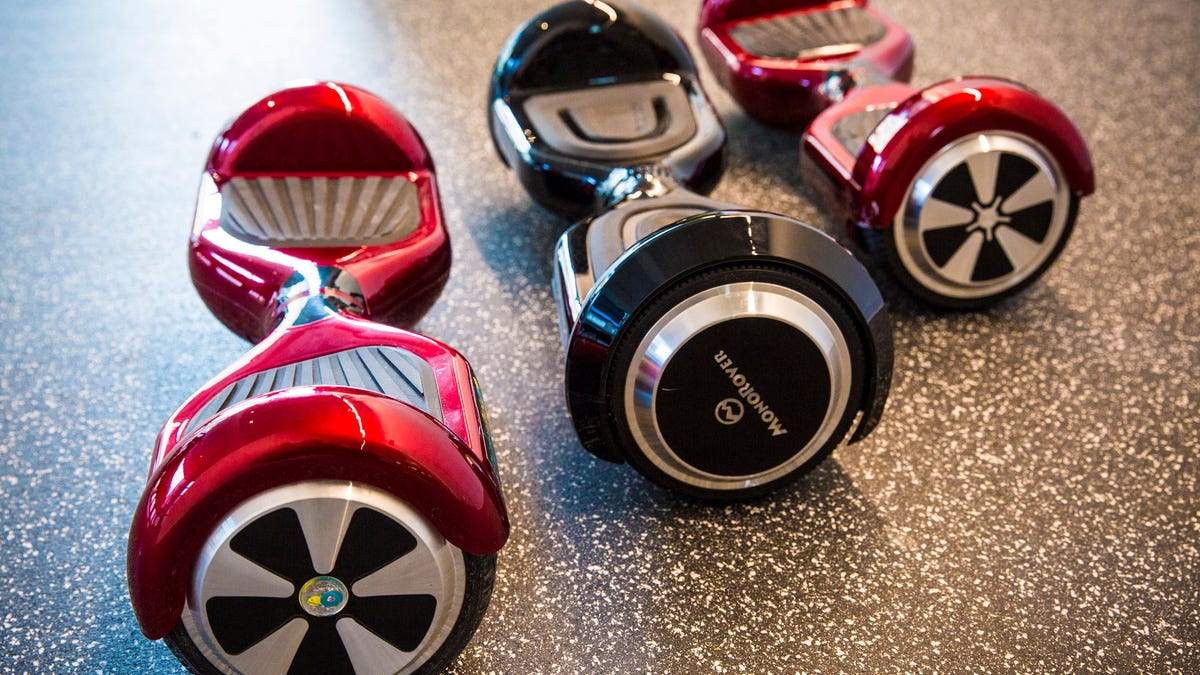Is Amazon yanking hoverboards over safety concerns?
Several brands of the self-balancing scooters have vanished from the Internet retailer following reports of fires.
Hoverboards are a hot item this holiday season. Perhaps too hot.
The self-balancing scooters have quickly grown popular with kids and fans of the "Back to the Future" movies, but now shoppers have to reckon with safety concerns after reports that some hoverboards have caught fire. Citing those concerns, airlines banned the boards from planes. Now the scooters are disappearing as well from some Internet retailers' shelves.
As first noted by Best Reviews, hoverboards made by Swagway have vanished from Amazon's site, a development that seems to be related to a safety notice Swagway says it received Friday from the Seattle-based Internet retailer.
"Amazon sent out a notice on Friday just before 5 p.m. PST, to all 'hoverboard' sellers to 'provide documentation demonstrating that all hoverboards you list are compliant with applicable safety standards,'" Swagway said in a statement, adding that Amazon expressed concern over potential danger from the hoverboards' batteries and chargers.
The reported fires have been linked to overheating of the boards' lithium ion batteries.
The hoverboards, which despite their name do not really hover, feature two wheels with a platform between them, plus an electric motor to put them in motion. They landed on the wish lists of many a daredevil this year after celebrities like Justin Bieber and Kendall Jenner posted photos of themselves zipping around (and falling off) the boards. The scooters appear to be just as hot with the US Consumer Product Safety Commission, which said it has received "at least 10" reports of hoverboard fires.
Swagway said that its boards meet standards and that it has provided Amazon with the information it requested. As of this writing, however, its boards have not returned to Amazon's site. The South Bend, Indiana-based company also said that many hoverboards from other manufacturers also have disappeared from Amazon's storefront.
While Swagway's boards are no longer listed on Amazon, models from competitors such as Razor and Jetson still appear there. Boards from IO Hawk and PhunkeeDuck, among other companies, are not listed.
If Amazon is pulling hoverboards, it wouldn't be the first to do so. Online retailer Overstock.com said Wednesday that it will no longer sell them because of safety concerns.
Despite repeated requests to verify Swagway's claim, Amazon has stayed mum about changes to its listings and declined to comment Monday night on the boards' disappearance.
Amazon allows third-party sellers to list items on its websites, but it tends to be restrictive about what those merchants can offer, which helps it cut down on counterfeits and potentially dangerous items, according to Wedbush analyst Gil Luria. The company is able to maintain tight controls on third-party merchandise by offering warehousing and shipping services for many of those sellers, so it can often do quality checks on items before sending them out. Other marketplaces, such as eBay or Etsy, only connect buyers and sellers, so don't have the same controls.
"Amazon for its entire history has been absolutely and continuously focused on providing good customer service, to an extreme," Luria said. "Keeping the safety of their customers [in mind] and making sure they don't have a bad experience seems to fit within that guideline."
The e-commerce giant made headlines several times earlier this year for yanking certain items, a near inevitability given the millions of products for sale. In June, Amazon and other retailers removed Confederate flags and related products from their stores following a shooting in a historic African-American church in South Carolina. In October, it banned Apple TV and Google streaming-TV devices from its website, though analysts saw that decision as a competitive move to protect Amazon's own Fire TV streaming device.
Worries about battery fires have led to a ban of hoverboards by most major US airlines. American, Delta, Southwest and United said last week that the devices are not allowed in carry-on or checked baggage.
The Consumer Product Safety Commission, meanwhile, has begun investigating whether faulty batteries are responsible for the fires.
"We consider this a priority investigation," Patty Davis, a spokeswoman for the agency, told CNN. "This is a popular holiday item and it's going to be in a lot of consumers' homes, and we'd like to quickly get to the bottom of why some hoverboards catch fire."
Updated, 8:30 a.m. PT: Added analyst comment and more background information.




